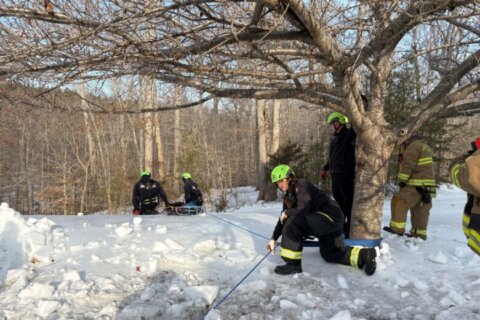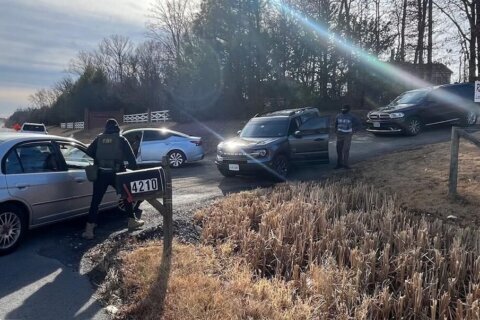This article was republished with permission from WTOP’s news partner InsideNoVa.com. Sign up for InsideNoVa.com’s free email subscription today.
This article was written by WTOP’s news partner InsideNoVa.com and republished with permission. Sign up for InsideNoVa.com’s free email subscription today.
Prince William County Public Schools is planning to join the growing wave of school divisions starting teaching apprenticeship programs next school year as part of a long-term effort to help teacher recruitment and retention.
Under Superintendent LaTanya McDade’s proposed fiscal 2024 budget, the school system next year plans to spend $3.3 million to expand its existing teacher-in-residency program for graduate students and start a first-of-its-kind apprenticeship program for undergraduates.
Facing another summer of elevated teaching vacancies, the division hopes to grow its nascent teacher-in-residency program for graduate students. The program had only one participant in the current school year.
But the apprenticeship program is completely new to Virginia after the state Department of Education issued over $140,000 in grants to nine universities to establish undergraduate apprenticeship programs with over a dozen public school divisions. It allows tuition and fees to be paid in return for a service commitment to work in a “hard-to-staff” school for three years following completion. Both programs will be run by the school system in conjunction with Virginia Commonwealth University.
In January, the state Department of Education and the Virginia Department of Labor and Industry signed an agreement allowing paid apprenticeships in the commonwealth after eight states – Arkansas, Colorado, Iowa, Kansas, New Hampshire, Tennessee, Texas and West Virginia – got approval from the U.S. Department of Labor for the nation’s first apprenticeship programs last year.
Although officials said the county schools would develop their own requirements, the education department is requiring 60 college credit hours – equivalent to an associate’s degree – to enter an apprenticeship program and be placed in a classroom with a mentor.
“I think everyone is seeing it’s a game-changer in addressing the teacher shortage that is nationally hitting us and especially by removing the financial barriers that have existed, at this point, for so many individuals that want to go into teaching but have not been able to take off for their job and pay for the coursework to do so,” Shelby Elliott, the school system’s administrative coordinator for certification and compliance, told InsideNoVa.
“And by now having a registered apprenticeship, moving forward next year, we can hopefully begin to offer salary and benefits to these individuals – a progressive wage that increases as they complete different levels so that they are not only learning, they’re earning while they’re learning,” Elliott added.
Investing in alternatives
Under both the undergraduate apprenticeship program and the graduate-level teacher-in-residency program, aspiring teachers will work in classrooms under the supervision of full-time mentor teachers (who also receive a stipend for the mentor work).
They will be able to run their own classrooms only after they finish their degrees and are licensed. Given that, school officials don’t plan to see a major impact for several years. The hope, they said, is to start with around 40 aspiring teachers next year. But in order to have tuition and fees paid for, the participants commit to spending at least three years teaching in those hard-to-staff schools.
The school system is turning to the programs as one of a suite of new initiatives aimed at growing alternative pathways into the classroom. Those include increasing the number of international teachers, the county’s version of a “Grow Our Own” program that tries to build a pipeline for county graduates to go into the education field locally, and the Teaching Professionals on Temporary Assignment, or TPOTA, program that lets college graduates with a year of classroom experience teach while working towards licensure.
“Enrollment in formal teacher prep programs across the country is down about 30%, so there are not as many teacher college graduates … and this has been a problem that’s been building, although I think the pandemic derailed a lot of folks in terms of education,” Donna Eagle, Prince William County Schools’ chief human resources officer, told InsideNoVa. “As a result, we’ve really spent significant time investing in alternative pathways to teacher licensure. This is one of a host of programs that the division is doing.”
Last fall, the Teaching Professionals on Temporary Assignment program brought over 74 additional teachers into the division for the start of the 2022-23 school year, but Eagle said that some who would enter that program may choose to go the teacher-in-residency route instead.
All told, Eagle told InsideNoVa that the system is currently short more than 200 general education and special education teachers and plans to fill around 1,000 positions ahead of the 2023-24 school year, close to the number it had to fill last summer.
Both Eagle and Human Resources Director Michele Salzano noted that the challenge with teacher shortages is not unique to Prince William. Nearly every state in the country reported facing teacher shortages before the 2022-23 school year.
“Our projections, or what we have calculated based on intent data [from current teachers], our trends and patterns for the last few years, we’re anticipating hiring about 1,000 teachers,” said Salzano, noting that the division will start with extra classrooms to fill with the opening of Rosemount Lewis Elementary School outside Manassas. “And so we’re monitoring that very closely, one resignation at a time, one new hire at a time.”







